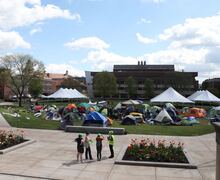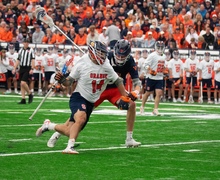‘It’s not supposed to be easy’
As dusk fell on a recent Friday, Muslims with ethnicities as diverse as Afghan, African, black, Pakistani, Palestinian, Saudi, white and Yemeni strode down Comstock Avenue. They were dressed in baggy jeans, dark business suits, tan slacks and traditional white dishdashas with matching flat-topped headdresses.
As they reached the doorway steps, the men came to a synchronized halt, kicked off their footwear and entered the mosque.
They had gathered to perform the Maghreb, or evening prayer, break their fast and celebrate Ramadan.
The ninth month of the Islamic lunar calendar, Ramadan, is considered a Holy month by Muslims. This year, the holiday falls in September. It is the month they believe Allah revealed the first verses of the Quran to the Prophet Muhammad. Of the five pillars of Islam, the fourth is Sawm, or fasting during Ramadan.
‘It’s a very unifying experience for a very ethnically diverse Muslim community,’ said Gustav Niebuhr, a professor of religion and media at Syracuse University.
Ramadan, which began Sept. 1, is arguably the most important aspect of the Muslim life. It is meant to teach compassion, patience and selflessness, said Ihsan Bagby, a National Board Member of the Council on American-Islamic Relations (CAIR), the largest civil liberties and advocacy group for Muslims in North America.
Each day, from dawn to dusk, every adult male and female Muslim who is physically able is required to forgo eating, drinking, sex, smoking and other worldly pleasures, said Hammam AlMakadma, an SU grad student.
‘It’s not just your stomach fasting,’ AlMakadma said. ‘It’s your eyes; it’s your ears; it’s your limbs.’
Special meals are eaten before and after each day of fasting: suhoor before the dawn prayers and iftar, the evening meal. Iftar is often eaten communally and includes dates, which Muslims eat as a symbolic breaking of fast. According to tradition, AlMakadma said, the Prophet Muhammad broke his own fast for the iftar dinner by consuming a date.
The mosque, or masjid, holds daily iftars, where hundreds come together at sunset to break their fast, said Ziad Aljohaiman, a student in the SU English Language Institute. And while many Muslims break their fasts at the mosque, others send food and money to the mosque for others to break their fast because Ramadan is also a time of charitable outreach.
‘Ramadan is a chance to serve and understand the suffering of others,’ AlMakadma said.
Matan Cafri, a sophomore in The College of Arts and Sciences, said the Abrahamic faiths – Christianity, Islam and Judaism – all have doctrines that emphasize the idea of self-denial, fasting and sacrifice.
Cafri said the interfaith relations at SU have transformed him. Having grown up Jewish with little positive exposure to Muslims and little interest in gaining any, he said he now counts Muslims at SU among his closest friends.
‘You know what, they are just like us,’ Cafri said. ‘We are all the same.’
Iftar dinners as social gathering
The Islamic Society of Central New York Mosque is a stark brick building, with a blue and white faade, that sits along Comstock Avenue. It has no dome, no high-ceilinged rooms, no elaborate murals. It is the place for Muslims to gather and break their fast.
After their prayer, which consisted of a series of raka’at, a ritual of bending and bowing accompanied by the proper invocations and prayers, men and women, who pray in separate rooms, shared pitted, gooey dates and cold bottles of Poland Spring water before huddling in the room below to join in a festive dinner.
The food – hunks of beef over a mountain of yellow rice – was generously poured onto paper plates and rapidly passed around. Sleeves rolled back; fast-moving children first, then adults, sat down on the sprawling Oriental rugs to break their fast. They ate heartily, and finally, as they sat back full, they looked refreshed and energized.
‘You feel especially happy when you eat iftar,’ AlMakadma said. ‘It’s really not the same feeling than when you are eating a normal meal.’
Iftar dinners like the one served at the mosque are intended to be community and social gatherings where families and friends join to feast together at the end the end of the day, Bagby said.
Students who cannot attend the iftar dinners served at the mosque can eat one on campus.
At SU, 25 to 30 students attend iftar dinners, catered and hosted by Shaw Hall, independently of SU, and sponsored by the Muslim Student Association, Monday through Thursday, during Ramadan.
‘It makes it easy on Muslim students,’ said Ahmed Al-Salem, a sophomore information studies student and president of the MSA. ‘They feel at home away from home.’
Ramadan away from home
Many foreign-Muslim students attending SU are observing Ramadan away from home, but not without challenges.
Ramadan is the time when first-generation immigrants feel the most homesick, Bagby said. The fasting can be especially hard for students, like Aljohaiman, who are fasting for the first time in a non-Muslim environment.
‘I’m all alone here,’ said Hessah Alojayan, an English Language Institute student. ‘After iftar, everybody goes back to their place, and that’s it. We are done.’
Alojayan said that in most Muslim and Arab nations, iftar is a social gathering that extended well past midnight.
In many Islamic countries, Ramadan is celebrated nationally. That means that not only just about everybody fasts, but also many restaurants and businesses trim down their working hours, and schools close earlier. In the U.S., international Muslim students agreed that they have to fast amid constant temptation.
‘It’s hard to watch people eat,’ Aljohaiman said. ‘In America, we are surrounded by food. It’s everywhere: in the class, in the street, on the TV. It’s everywhere.’
For Aljohaiman, the powerful growl of his stomach is a reminder that Ramadan is a time when food takes lesser significance.
Some Muslim students, however, said that Ramadan in America should be no different than Ramadan anywhere else.
‘My daily routine doesn’t change (Ramadan),’ AlMakadma said. ‘I don’t lie around and sleep all day waiting for the sun to go down. Then you’re missing the whole point of fasting. It’s not supposed to be easy. Ramadan doesn’t keep me from being productive and do the things I am supposed to do here.’
Sitting by the rain-streaked window of the Marshall Street Starbucks, AlMakadma said he was raised a devout Muslim in his native Saudi Arabia. He began reading the Quran in second grade and started fasting soon after.
With his narrow face, hooded dark eyes and sharp nose, he looked scantily fed, wearing a droopy short-sleeved shirt that hung loose on his frame.
‘You are supposed to accomplish more during Ramadan,’ he said. ‘I go to classes, take exams and stay active. It’s more demanding, but it’s also more rewarding that way.’
A time of peace
For many Muslim students, Ramadan is a period of intense spiritual exploration. It allows introspection and the search for purity within oneself, AlMakadma said.
‘It’s a chance to think about life, a chance to be grateful,’ he said. ‘It’s a time of peace.’
Ramadan is not just a personal struggle, some students agreed, stressing the importance of community building and interfaith understanding. It is a time to reach across cultural lines, Bagby said.
Aljohaiman said that inviting non-Muslim to the iftar is an occasion to teach them about Islam and break down the typical stereotype that casts Muslims as fear mongers and terrorists.
For AlMakadma, Ramadan is a good time to educate Muslims and non-Muslims alike on what Islam really says about religious freedom.
‘There is no compulsion in religion. Every soul is free to believe what he or she wants,’ AlMakadma said, quoting the Quran.
He said, ‘Islam is not the faith of fanatics.’
Published on September 22, 2008 at 12:00 pm




